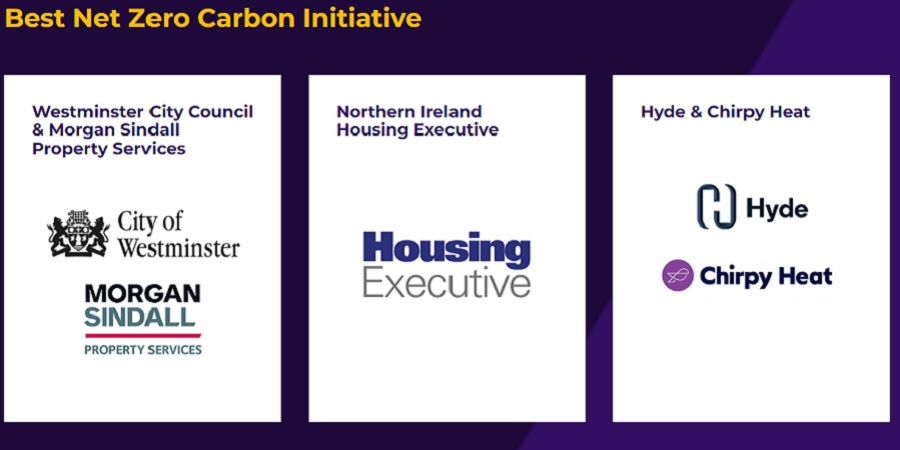Orbit’s Net Zero Carbon Roadmap
This Case Study demonstrates how Orbit developed its Roadmap and how it is planning to implement it. It will enable other organisations to consider how they can develop their own Net Zero Carbon Roadmaps.

Orbit published its Net Zero Carbon Roadmap in November 2021 at COP26, setting out how it would deliver its commitment to being net zero carbon across its operations, homes and supply chain. It had already set a commitment to reduce its environmental impact in its Orbit 25 strategy and intended to be Net Zero Carbon in its operations by 2030 (Scope 1 & 2) and in its customers’ homes and supply chain before 2050 (Scope 3).
How did Orbit develop its Roadmap?
Orbit decided to recruit a Head of Environmental Sustainability and a Head of Carbon (internally recruited) within Strategic Asset Management team to lead on decarbonisation of its housing. Together, they created the Carbon Forum, chaired by the Head of Carbon. The Forum reports to its Earth Steering Group, chaired by Head of Environmental Sustainability. Orbit Earth is the environmental programme for all themes across the Group.
Orbit then undertook an in-depth exercise to calculate its Scope 3 greenhouse gas (GHG) emissions as well as its Scope 1 and 2 emissions. The upstream emissions from its supply chain were calculated using a template provided by the Carbon Trust. Its downstream emissions from customers’ properties were calculated by Savills, using SAP 2012 but these will need to be reviewed against SAP10.2.
This data provided a solid baseline from which to chart a long-term trajectory to achieve Net Zero Carbon before 2050. It was a Science Based Target (SBT). SBTs are managed by the Science Based Targets initiative, which offers guidance and a SBT tool that Orbit used to input its GHG emissions to establish what reductions were needed to achieve by 2030, as well as for its longer-term commitment to NZC by 2050. A 50% reduction by 2030 was required against its baseline year (April 2018 – March 2019) for Scope 1 and 2 emissions. Organisations with more than 40% of their GHG emissions in Scope 3 (supply chain, customer, business travel, etc) must have targets in place for these to align with the SBT methodology but these are not required to be as quantifiable as Scope 1 and 2 emissions.
Meanwhile, the Carbon Forum conducted a series of 9 NZC workshops to identify how reductions could be made in order to ensure that SBT targets could be set.
Over the following months, members and others from the business came together to discuss opportunities to reduce emissions across different areas. These included:
- Defining a NZC home
- How it should be heated
- Renewables and Storage
- Customer Engagement
- Decarbonising the supply chain
- Decarbonising construction
- Decarbonising communal spaces
- Decarbonising our offices
- Designing a travel policy
The groups’ recommendations were then modelled for their impact on Orbit’s current GHG emissions that projected the net GHG and cost impact of the measures on the Group and its customers.
A number of initiatives were already being undertaken, such as a programme of Building Management System enhancements.
Combining the results of the data analysis with the workshop recommendations, Orbit was able to adopt a 50% reduction target in Scope 1 and 2 emissions by 2030, EPC C or higher for all homes by 2030 and NZC for housing and supply chain by 2050.
How long did this take?
Orbit began calculating its carbon footprint in 2018-19, with one-off support from the Carbon Trust and published its Roadmap in November 2021.
During this time, it started recruiting in 2020, with Head of Environmental Sustainability and Head of Carbon (Asset Management) appointed by the beginning of 2021. The Carbon Forum was set up in April 2021 and final proposals were agreed by Executive team in August 2021. From late August to beginning of November, the NZC Roadmap was produced and a more detailed delivery plan developed, with the Board updated in September. From June – November 2021 it undertook a series of events and published thought leadership articles to communicate the research and assumptions being used to develop the Roadmap to all key stakeholders.
What was involved in getting the Roadmap accepted?
During this process, the Head of Environmental Sustainability partnered with the Head of external communications, who had previous experience with sustainability strategy for some large organisations. She was meeting regularly with the CEO already and so arranged a meeting to secure his support. With the CEO’s support, the Team conducted a series of consultations with each of the 5 senior management teams. The final proposal was taken to the Executive Team August 2021. After all the feedback had been reviewed and changes made, it was approved.
What are the next steps?
To deliver the demonstrator project Orbit, awarded by the Social Housing Decarbonisation Fund (SHDF). Its Wave 1 applications have been successful. The delivery plan is being reviewed with responsibilities and budgets being finalised.
To recruit an Energy Lead to support the non-housing elements of NZC roadmap, since low-level but impactful investments and behaviour change initiatives can reduce carbon and costs for Orbit and its Customers.
Its Carbon Forum to identify new technologies and measures to be adopted and to review progress against the NZC Roadmap. Then set up its Environmental management system to include these actions and to be ISO14001: 2015 certified later in 2022 and achieve Carbon Trust certification late 2022.
To implement Orbit’s decarbonisation retrofit programme:
- Stage 1 – Improve the insulation of customers’ homes to reduce heat demand and fuel costs by 2040
- Stage 2 – Remove fossil fuel heating and replace with alternative zero or low carbon systems. Consider lighting and electrical appliances.
- Stage 3 – Install renewable energy systems (including storage) to provide all electrical demand.
- Stage 4 – Further carbon off-setting.
Note: This is part of series of Best Practice articles and case studies that the NHMF is producing.
NHMF hosted a webinar on The Social Sector Response to Zero Carbon on 12 October.
You can see the presentations at: https://www.nhmf.co.uk/training.
Further webinars will be planned for 2022.


